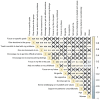Group Psychological Treatment Preferences of Individuals Living With Chronic Disease: Brief Report of a Saskatchewan-Based Cross-Sectional Survey
- PMID: 38465596
- PMCID: PMC10929047
- DOI: 10.1177/00469580241237112
Group Psychological Treatment Preferences of Individuals Living With Chronic Disease: Brief Report of a Saskatchewan-Based Cross-Sectional Survey
Abstract
Given that individuals with chronic diseases comorbid with psychological distress experience worse clinical outcomes than those without psychological distress, treatment of the psychological sequalae that accompanies chronic diseases is of utmost importance. Thus, the present study aimed to examine group treatment preferences among adults living with chronic disease in Saskatchewan, Canada. An online survey regarding group treatment preferences was administered to 207 participants living with chronic disease comorbid with psychological distress. The most often reported treatment scenario was virtual sessions (45%) lasting 1 h (51%) and occurring every other week (45%) in the evening (63%) for 3 to4 months (40%). Preferences included a medium group (48%), a relatively closed group nature (ie, only occasional new members; 44%), and group leadership including at least 1 professional living with chronic disease (54%). Future-oriented (81%), supportive (83%), skill-based (95%), and group discussions (78%) were desired treatment characteristics among participants. Survey results showed clear preferences on treatment content and session logistics. Slight variations exist by gender and age, but a consensus can be identified and act as a preliminary treatment plan. This study contributes to the body of literature on psychological treatment preferences for individuals living with chronic disease by outlining the preferred format and composition of groups according to those with lived experience. Group-based psychological treatment for chronic disease patients should account for these preferences to improve its acceptability and usefulness among patients.
Keywords: chronic disease; group therapy; mental health; patient preferences; psychological distress.
Conflict of interest statement
Declaration of Conflicting InterestsThe author(s) declared no potential conflicts of interest with respect to the research, authorship, and/or publication of this article.
Figures
References
-
- Ronksley PE, Sanmartin C, Campbell DJ, et al.. Perceived barriers to primary care among western Canadians with chronic conditions. Health Rep. 2014;25(4):3-10. - PubMed
-
- Government of Saskatchewan. Prevalence of asthma, COPD, diabetes, ischemic heart disease and heart failure in Saskatchewan [Internet]. 2016. [cited 2023 February 23]. https://pubsaskdev.blob.core.windows.net/pubsask-prod/108333/108333-2016...
-
- Government of Canada. Aging and chronic diseases: A profile of Canadian Seniors [Internet]. 2020. [cited February 23, 2023]. https://www.canada.ca/en/public-health/services/publications/diseases-co...
-
- World Health Organization. Noncommunicable diseases [Internet]. 2022. [cited February 23, 2023]. https://www.who.int/news-room/fact-sheets/detail/noncommunicable-diseases
Publication types
MeSH terms
LinkOut - more resources
Full Text Sources


